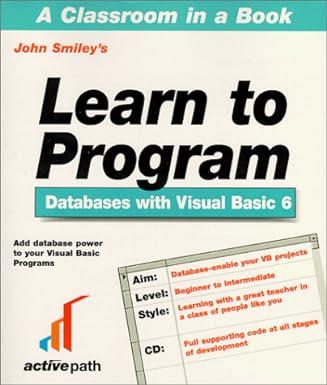Question
Given a text file, your program will determine if all the parentheses, braces, and square brackets match, and are nested appropriately. Your program should work
Given a text file, your program will determine if all the parentheses, braces, and square brackets match, and are nested appropriately. Your program should work for mathematical formulas and most computer programs.
Your program should read in the characters from the file, but ignore all characters except for the following: { } ( ) [ ]
Your program should use the IntStack declaration (IntStack.h), which will be available from Tracs).
The general algorithm is to use a stack to store the opening unmatched brackets. When a closing bracket is encountered, check it against the one on top of the stack-- make sure it matches, and pop it off. When you are finished there should be no unmatched brackets left on the stack.
Input/Output:
Your driver program must prompt the user to enter a filename. It should then try to open the file and then check it to ensure the brackets all match appropriately. If they all match, the program should output a message saying so. If not, the program should output an appropriate error message (there are three possible error messages corresponding to three types of errors shown as follows).
There are three types of errors that can happen (and with any kind of bracket):
missing } : if you reach the end of the file, and there is an opening { that was never matched, like: int main () { x[size]=10;
expected } but found ) : this is a wrong closing bracket, like: {x[i]=10;)...
unmatched } : this occurs if there is a closing bracket but not an opening bracket (not even one of the wrong kind), like: int main () { x[i]=10; } }...
NOTES:
This program must be done in a Linux or Unix environment, using a command line compiler like g++. Do not use codeblocks, eclipse, or Xcode to compile.
As soon as your driver encounters an error, your program should stop and print out the appropriate error message. Do NOT try to keep going and find more errors!
The stack is an int stack but you will probably want to put characters on the stack. You can push a character directly on the int stack (it will automatically be converted to an int). When you pop I recommend popping into a char variable first (this will automatically convert the int back into a character).
It might be easier to store the expected closing character on the stack when an opening bracket is encountered. This simplifies the matching when a closing bracket is encountered.
Beware of stack underflow! Do NOT try to pop an empty stack! If you get an error message like this when you run your program: Assertion failed: (!isEmpty()) then you are popping an empty stack: your program should prevent this and output its own appropriate error message instead. Follow the style guidelines from the Tracs. Logistics: For this assignment you need to submit two files: IntStack.cpp and your driver file. Please zip these into one file, assign6_xxxxxx.zip (where xxxxx is your NetID). Then submit the zip file
Pls use this header file
// Specification file for the IntStack class // Adapted from Gaddis source code class IntStack { private: struct Node{ int data; Node* next; }; Node* head; //ptr to top public: // Constructor IntStack(); //Destructor ~IntStack(); // Stack operations void push(int); int pop(); bool isFull(); bool isEmpty(); };
Please use structure in the class as shown in the header file
Step by Step Solution
There are 3 Steps involved in it
Step: 1

Get Instant Access to Expert-Tailored Solutions
See step-by-step solutions with expert insights and AI powered tools for academic success
Step: 2

Step: 3

Ace Your Homework with AI
Get the answers you need in no time with our AI-driven, step-by-step assistance
Get Started


